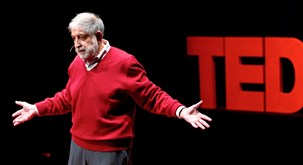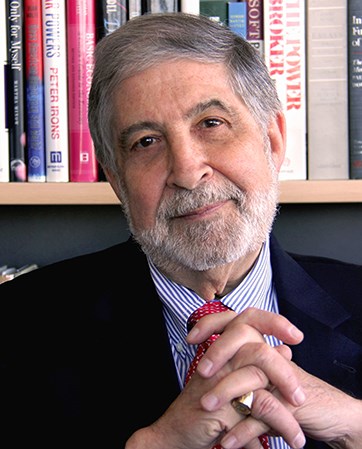Speakers By Topic

Speakers By Type




"{{ovation.quote}}"
-{{ovation.company}}Fixing America's Broken Political System
Mickey Edwards has been a part of – and a student of -- America’s political system, first from the outside, as a partisan party leader and conservative political activist; then, from deep within the system itself, as a senior member of Congress, a member of the congressional leadership and an advisor to Presidents, and then from the outside again, as an award-winning lecturer at Harvard and Princeton, a political columnist and broadcaster, and a mentor to a new generation of public officeholders. It has been a unique vantage point, one matched by no other observer of American politics, and that combination of perspectives has led to a series of breathtaking proposals not to replace one party with another, or replace some officials with others, but to change the entire political system from top to bottom, creating a system that recaptures what America’s founders intended: a government in which the voice of the people is actually heard; a system in which, within the bounds of the Constitution, the people themselves control the levers of government.
What Edwards proposes is a far-reaching change in how campaigns are funded, eradicating the ability of political insiders to limit voters’ choices by controlling who can be on the ballot, and depriving parties of the right to shape congressional districts for their own advantage, undermining the Founders’ vision of truly representative government.
Does the Constitution Still Matter? Americans and the Surveillance State
Fierce, articulate, and non-partisan in his judgments, Mickey Edwards is one of the nation’s best-known defenders of the Constitution, protesting unconstitutional expansions of federal and presidential power (regardless of which political party is guilty), criticizing practices by police and prosecutors that limit a citizen’s access to justice, and arguing against federal and local government targeting of American citizens with far-reaching surveillance activities. A board member of both The Constitution Project and the Project on Government Oversight and co-chair of a task force on privacy and security, he played a central role in an MSNBC special debating the NSA’s surveillance programs, was part of a select American Bar Association Task Force investigating presidential claims of the authority to bypass federal law, a key member of the American Society for International Law’s task force on limits to the authority of the International Criminal Court and co-chairman of a high-level Constitution Project task force on the war power. As a member of Congress for 16 years, he fought vigorously against well-intended reforms that violated fundamental tenets of the Constitution and pressed his congressional colleagues to meet the responsibilities the Constitution had placed on them.
A former professor at Harvard, Princeton, Georgetown, and the University of Maryland Law School, Edwards has defended the Constitution at law schools, public policy schools, and at public events in every part of the country and in dozens of newspaper and magazine articles.
Reclaiming Conservatism
Nobody has had a better, or more comprehensive, close-up view of American conservatism – and how it has changed – than Mickey Edwards. A leader in Barry Goldwater’s grassroots campaign to reshape the Republican Party, national vice chairman for the Young Republicans when they formed the conservative core of the party’s activist base, national chairman of the American Conservative Union, chairman of the Conservative Political Action Conference, one of three founding trustees of the conservative Heritage Foundation, a conservative staffer for Republican members of Congress, director of the Reagan presidential campaign’s joint House-Senate policy advisory committees. It was Edwards who hit the campaign trail for Reagan, was with him in his hotel room in New Hampshire when he won that state’s pivotal presidential primary, and later intervened with fellow conservatives to bridge the gap between movement activists and Reagan’s Vice President, and later President, George H.W. Bush. And it was Edwards who helped shape the Republican national convention platform for the Reagan campaign.
But what conservatism was then and what it is now are very different animals. As Edwards wrote in his book “Reclaiming Conservatism: How a Great American Political Movement Got Lost and How It Can Find Its Way Back”, published by Oxford University Press, people who call themselves conservatives today support positions that earlier conservative would have marched on Washington to protest, including government surveillance of citizens and defense of corporate abuse (earlier conservatives championed small business and market competition). In his devastating critique, Edwards cites dramatic changes in Republican Party platforms as the party and its conservative movement have begun more and more to represent the antithesis of what they once stood for. Neither Goldwater, conservative’s 1964 choice for President, nor Reagan, their choice in 1980, could win a Republican primary today, Edwards claims. As for himself, he points to a study by a political science professor who found that Edwards, once chairman of the American Conservative Union, with a 100 percent conservative rating, one of the most conservative members of Congress for 16 years, would be one of the more liberal Republicans in Congress today if he voted exactly the same way.
But Mickey Edwards does not know modern conservatism only through an activist lens. When he left Congress after 16 years, during which he was an acknowledged conservative leader, he continued to write from a conservative viewpoint in weekly newspaper columns in the Los Angeles Times, Chicago Tribune, and Boston Herald, and in a weekly broadcast on NPR’s “All Things Considered” (his Los Angeles column was entitled “On the Right”). At the same time, he introduced a new class on American conservatism at Harvard, where he had begun a teaching career that lasted 16 years at Harvard, Princeton, George Washington University, and Georgetown. The course examined every aspect of American conservatism (distinguishing it from European and Asian conservatism; American conservatism at its root was originally similar to the European liberalism of John Locke, with its emphasis on individual rights and freedoms). Edwards taught about conservatism by looking at both policy and theory, introducing students to the work of Hayek, Von Mises, Friedman, Churchill, Burke, Buckley, Kirk, Irving Kristol, and other voices of the early conservative movement.
The heart of Edwards’ argument is that what passes for conservatism today is not that at all, but a hodgepodge of big government and anti-government, liberty and state control, populism and elitism, limited government and military adventurism. It is an argument he has taken all over the country, on campuses, through the airwaves, in newspaper and magazine articles. It is not an attack on conservative ideas but an attempt to reclaim them and to recapture the title from those who have usurped the name of the movement without even a rudimentary understanding of its principles.
NOTE: Although the bulk of my talks between 2008 and 2011 were about the changes affecting American conservatism and the Republican Party, and since 2012 have been almost exclusively about proposals to repair the American political system, I am qualified to address several other issues. Since I don’t know how many you wish to feature, here is a capsule summary which I am happy to expand as you wish or if you become aware of openings for these topics:
Educating Citizens to be Citizens
Mickey Edwards was a featured speaker at an international humanities conference in Italy and has been a frequent critic of the failure of American schools and universities to adequately teach civics, critical thinking, and the various elements of a humanities curriculum. Edwards argues that our schools, including the best of them, have essentially been turned into vo-tech schools, training Americans for employment – and to be part of the nation’s economic machinery – but not to be thoughtful, knowledgeable citizens, capable of meeting their constitutional responsibilities as final arbiters of government policy.
Creating a Responsible Foreign Policy
Mickey Edwards spent most of his congressional career in the field of international affairs as the ranking member of the House subcommittee on foreign operations, official observer of numerous overseas elections, a contributor to magazines on international affairs, speaker at the U.S. Naval Academy and the U.S. Military Academy, advisor to the U.S. State Department under Secretary Colin Powell and foreign policy advisor to George W. Bush’s presidential campaign. Edwards was a leader in the Congress’s support for the first Gulf War but has been a frequent critic of America’s seeming insistence on inserting itself into difficulties wherever they occur around the world: not a pacifist and not an isolationist – he has written persuasively for America’s role as a promoter of human rights and liberal democracy, he believes the U.S. needs to be more deliberate about when and where it intrudes on the international stage.
The Absent Congress
The Constitution places almost every major power of the federal government – over war, taxes, spending, treaties, judicial appointments, creating or ending public programs, even determining who may sit in the President’s Cabinet. And yet, Mickey Edwards, a former member of the congressional leadership during 16 years in the House, argues that today’s Congress repeatedly fails to meet its constitutional obligations, criticizing presidential overreaching but doing nothing to assert its own authority as a maker of laws and overseer of the executive branch. If impeachment is to be considered, Edwards argues, maybe it is the Congress that should be impeached.
Mickey Edwards was a member of Congress for 16 years, serving on the House Budget and Appropriations Committees and as a chairman of the House Republican Policy Committee. After leaving Congress he taught for 11 years at Harvard’s Kennedy School of Government before moving on first to Princeton’s Woodrow Wilson School of Public and International Affairs and then back to Washington, DC, as vice president of the Aspen Institute, where he directed a bipartisan fellowship for elected public officials. He left the Aspen Institute at the end of 2019 and returned to Princeton, where he is currently a visiting professor teaching government, politics, and public leadership.
Edwards, who grew up in Oklahoma City, has degrees in both law and journalism. He began his career as a newspaper editor and reporter and later won awards in advertising and public relations before being elected to Congress. While teaching at Harvard he returned to journalism as a weekly political columnist for the Chicago Tribune and Los Angeles Times and broadcast a weekly commentary on National Public Radio’s “All Things Considered.”
Edwards was a board member of both the Constitution Project, where he chaired task forces on judicial independence and the war power, and the Project on Government Oversight. He was a member of the American Bar Association’s select task force on the use of presidential signing statements and the American Society of International Law’s task force on the International Criminal Court and has chaired policy task forces for both the Brookings Institution and the Council on Foreign Relations. Edwards has been elected a fellow of the American Academy of Arts and Sciences.
Among his books are Reclaiming Conservatism, published in 2008 by Oxford University Press, and The Parties Versus the People: How to Turn Republicans and Democrats Into Americans, published in 2013 by Yale University Press. His articles have appeared frequently in publications ranging from the New York Times and The Washington Post to Daedalus, The Public Interest, and The Atlantic. He is a frequent public speaker and has been a guest on many of the nation’s leading radio and television news and opinion broadcasts.